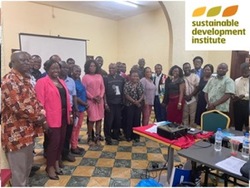New Republic | 9 May 2022
Stakeholders at CSOs-OPWG engagement meeting
Stakeholders at CSOs-OPWG engagement meeting
MONROVIA-As part of efforts in mitigating the numerous challenges confronting stakeholders in the Oil Palm Sector and other human rights issues, participants at a one day Civil Society Organizations Oil Palm Working Group (CSOs-OPWG) meeting through the Sustainable Development Institute (SDI) under the Green Livelihood Alliance 2.0 (GLA) project have agreed on several strategies to work within making the sector better.
The one-day event on Thursday, May 5, 2022 was the maiden edition of the quarterly information sharing and engagement meetings with Technical Departments of Line Ministries, Agencies, and Civil Society Organizations.
The interactive round table discussion at a local hotel in Sinkor, was meant to build and strengthen a multi-stakeholders platform and inclusive partnership and cooperation of state and Non-state Actors for effective implementation of business and Human Rights in the Natural Resource Sector of Liberia.
The Line Ministries and Agencies in attendance include: Ministry of Justice, the Environmental Protection Agency (EPA), Liberia Land Authority (LLA), National Bureau of Concession (NBC), and Independent National Commission on Human Rights (INHCR), Ministry of Agriculture (MOA), & National Investment Commission (NIC).
The CSOs include Sustainable Development Institute (SDI), Save My Future Foundation (SAMFU), Rural Integrated Center for Community Empowerment (RICCE), Liberia Forest Media Watch (LFMW), Journalists for the Protection of Nature (JPN), Social Entrepreneurs for Sustainable Development (SESDev), Women in Agriculture for Sustainable Development (WASUDEV), members of the Business and Human Rights Network Resource Center among others.
During the meeting, the participants outlined several challenges ranging from lack of community benefits or social agreements, destruction of sacred places including ancestral gravesites, Human right violations, long period of service as casual laborers, sexual and other abuses, pollution, low wages among others.
Others include unsafe working environment, illegal process of acquiring land/land grabs, interference of state actors in community rights issues, monitoring fatigue, lack of funding, and policy formalization, lack of proper transition for new companies taking over previous ones, limited powers for regulatory agencies, low manpower, lack of information sharing, logistic, limited capacity, political influence among others.
During the meeting, some state-actors complained over lack of understating of the Land Rights Act by judicial actors, lack of prosecutorial powers, lack of updates and coordination, overlapping of functions and responsibilities, poor communication system, lack of independence from CSOs monitors among others.
However, the stakeholders at the end of the meeting agreed to among others things ensure effective information sharing, resource mobilization to aid smaller organizations, cement relationship through an active platform, strengthen integrity and trust between Government and CSOs by giving credits to institutions, regular routine meeting through networking, establish a result-oriented team and organize technical and policymakers team as well.
They also planned to focus on capacity building and training, create more awareness on Business and Human Rights (BHR), coordinate in resolving issues, improving coordination and collaboration among others.
Giving the overview of the meeting earlier, Richard N. Sam, Regional Program Officer at SDI reminded his colleagues that addressing most of these challenges confronting them require well-coordinated and concerted efforts, collaboration, and partnership with government, CSOs, experts and local communities.
Mr. Sam further said partnership and coordination had not been strong and proactive to address these challenges in the natural resource sector.
At the meeting, the National Program Assistant at SDI, Sampson M Williams who outlined the workings of the Sustainable Development Institute (SDI) since its inception said the organization was previously accused of being anti-government due to the nature of its work. He however said following numerous engagements with government institutions with such beliefs, they are now considered serious partners.
The Director of Human Rights Department at the Ministry of Justice, Kutaka Divine Togba who made a presentation on Business and Human Rights (BHR) said the roles of CSOs should never be underestimated.
“We have a platform where we all can sit together and discuss. Government needs to take the lead and ensure businesses respect human rights and best practices. Businesses need to be respected and they too need to respect the customary communities,” he said.
Also speaking, the Executive Director of SDI, Mr. Wilfred Gray-Johnson called for concerted efforts in working together. Mr. Gray-Johnson reminded his colleagues that CSOs need to be advocates, amplify their voices, engage in research and inform policy actions.
Also speaking at the well-attended meeting was INCHR Commissioner Pandarous Allison.
He serves as Commissioner for resource mobilization at the Independent National Commission on Human Rights. In his remark, he urged participants not to only monitor human rights abuses and violations in concession areas, but should also look at big businesses operating in Monrovia with foreign nationals.
At the end of the meeting, the policy makers in attendance pledged their unflinching supports in working with Civil Society Organizations Oil Palm Working Group (CSOs-OPWG) in ensuring that concessions wouldn’t be a curse for the communities and Liberia, but a blessing.














